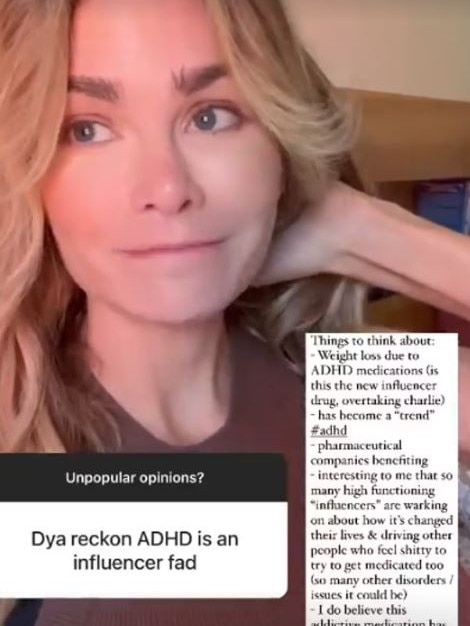Real reason more Australians are being diagnosed with ADHD
ADHD has long been associated with children. But now, a growing number of Australian adults are being diagnosed – and an expert has revealed why.

Health
Don't miss out on the headlines from Health. Followed categories will be added to My News.
ADHD – attention-deficit/hyperactivity disorder – has long been associated with children.
But now, a growing number of Australian adults are reaching out for help.
Speaking to news.com.au’s podcast, I’ve Got News For You, Monash University cognitive neuroscience Professor Mark Bellgrove, said that adult diagnoses of ADHD are definitely “on the rise”.
“This is largely because awareness of ADHD is increasingly becoming more prevalent,” Prof Bellgrove, who is director of research at the Turner Institute for Brain and Mental Health, told host Andrew Bucklow.
“And what means is that adults are coming forward for diagnoses more than they have before.
“But this is, we think, still largely representing an under-diagnosis of adult ADHD in the Australian population.
“Roughly 2.5 per cent of the population, by population prevalence rates, will have ADHD and we know the diagnosis rates in Australia are much less than that.”
One person who has drawn attention to the difficulty of being diagnosed – especially as a woman – is Abbie Chatfield, who revealed her own ADHD diagnosis in May after a months-long process.
The 27-year-old influencer and podcast host again addressed “how f***ing hard it is to get ADHD medication or to get diagnosed” when responding last week to comments made by fellow Bachelor alum Megan Leto Marx, who deemed ADHD the new influencer “trend” in an Instagram Q&A.
Stream the latest health news with Flash. 25+ news channels in 1 place. New to Flash? Try 1 month free. Offer available for a limited time only >


“It’s actually a diagnosis and a health condition that affects people’s lives,” Chatfield said.
“This idea that it’s a trend or that you shouldn’t be on medication is so ableist and so offensive.
“Only now – through social media and speaking about the f***ing symptoms that are debilitating – are [people] able to f***ing see that they might have it.
“People with an ADHD diagnosis didn’t up one day and go, ‘I’d like to spend 18 months on a waitlist and a lot of my f***ing money and time just so I can fit in with a trend.’”
Prof Bellgrove said: “A real point of concern for us and for everyone in the discipline who’s involved in treating and diagnosing ADHD [is that] the waitlist can be up to a year.
“This is, I think, really important for the public to understand that ADHD in adulthood is not treated within the public health system, really at all,” he said.

“And what that means is people need to wait to get appointments for either a private psychiatrist or a private psychologist, and those waitlist times are long, and the appointments are inevitably reasonably expensive because there is no public treatment.
“This is something that really has to change. It’s a massive, massive point of health inequity, for folks with ADHD, that there’s no public treatment in adulthood.”
Chatfield also shut down Marx’s harmful assertion that ADHD medication is “basically meth”, and that influencers are only taking it because it makes you “lose your appetite”.
“Who the f**k do you think you are saying that people are owed an explanation for anybody’s weight loss or weight gain?” Chatfield, who recently spoke about medication and weight loss on her podcast, fired back.
“The reason why people don’t speak about ADHD medication making you lose weight is these people don’t want to encourage you to take medication to lose weight.
“People are trying to destigmatise medication for mental health issues. It’s important to speak about medication if you feel comfortable. No one has to tell you anything, particularly why they’ve lost weight.”
Prof Bellgrove said that medication “can have really quite dramatic effects on the person with ADHD”.
“We often say that these medications, not only are life-changing in many cases, they can really be lifesaving for folks with ADHD,” he said.
“Medication can really bring about a massive change.”
He urged the Federal Government “to view ADHD like we would do any other form of mental illness”, as a means of reducing stigma, and making receiving a diagnosis and treatment more accessible for all Australian adults.
“We’re used to asking about anxiety and depression, we’re used to checking in with people regarding their mental health and supporting them. But we haven’t yet reached the level in society that we’re as comfortable talking about ADHD and checking in with it in the same way,” Prof Bellgrove said.
“And as a result, it has not reached the same level of priority within the Government and within the funding systems that it needs to … We have this situation where we have health inequities, and folks with ADHD aren’t able to access diagnosis and treatment as readily as for other conditions.
“And I think, really, that has to change. It can’t stand,” he said.
“We’re missing an opportunity here to maximise the potential of all these folks within society. And, you know, allow them to live healthy, happy, productive lives that are really going to contribute effectively to Australian society, and I think it has to change. That can’t go on.”
Originally published as Real reason more Australians are being diagnosed with ADHD





